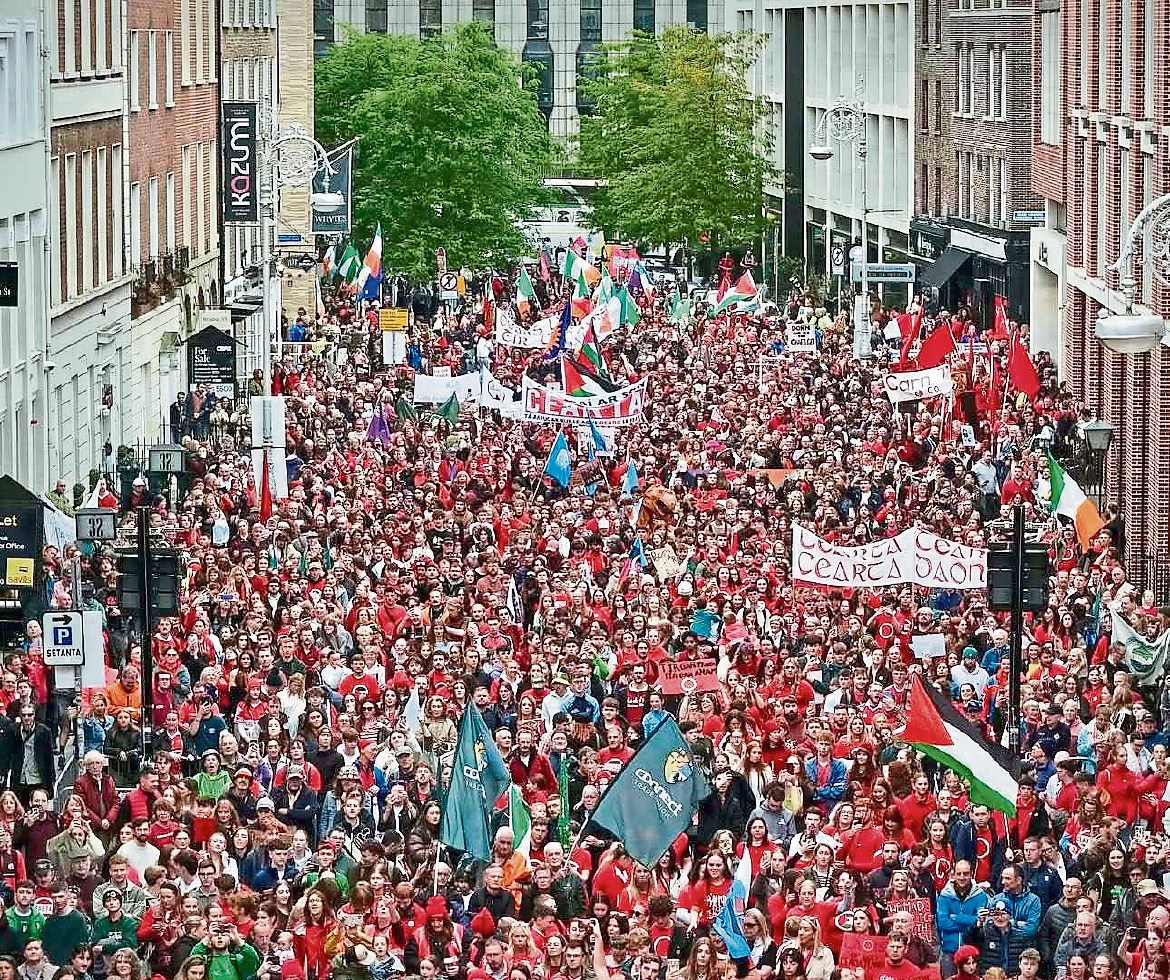By Róise Collins
TWENTY-FIVE THOUSAND people gathered in Dublin at the weekend to take part in a national protest demanding urgent political intervention for the Irish language and the Gaeltacht.
On Saturday morning busloads travelled from Donegal’s Gaeltacht to the capital, with local community groups, teachers, students, musicians, Donegal County Councillors and TDs among them.
Together, they marched from Parnell Square to Leinster House, where Donegal took centre stage.
Rann na Feirste’s Hugh Carr, who is a well-known radio presenter on RTÉ 2FM, MCed the event alongside Ireland AM presenter, Síomha Ní Ruairc.
As Fear an Tí, Hugh led chants from the main stage, shouting “Dearg le Fearg” (red with anger), while a sea of thousands dressed in red roared back in support.
The protest, held under the CEARTA banner, was organised by a coalition of language rights groups and community organisations. They are united in calling for better services and funding across the Gaeltacht.
CEARTA has highlighted four key areas where they believe the government is failing: Gaeltacht housing, funding, education and language rights.
Also taking to the stage was Niamh Ní Dhubhgáin from Tory Island, who delivered a powerful performance of a self-penned song set to the tune of the popular Kingfishr hit Killeagh.
Using her platform to highlight the housing crisis in Gaeltacht communities, Niamh captivated protesters with her message.
Working as a teacher at Coláiste Lurgan in the Connemara Gaeltacht during the summer months, Niamh is no stranger to creativity. The Irish-language college is renowned for its Irish translations of hit songs.
But this time it wasn’t a translation – it was much more poignant.
The inspiration came from a stark poster she saw, outlining the housing reality in the small Gaeltacht area: 22 houses available on Airbnb, and none on Daft.ie.
“It really annoyed me,” Niamh told the Donegal News.
“It set off something in my brain and that night I couldn’t sleep. So instead of translating Killeagh, I could hear the lyrics ‘Níl cead pleanála-la-la’ (No planning permission).”
Her song was also inspired by the work of Tinteán and Banú, two community organisations working to raise awareness about the housing crisis in Gaeltacht areas.
The issue is not confined to Connemara, it’s just as critical in the Donegal Gaeltacht, where the number of houses available for short-term rental far outweighs those available for long-term lets.
As a result, local people are being pushed out and with them the Irish language is increasingly under threat.
Niamh also spoke of how cuts to funding are compounding these challenges for Gaeltacht communities. She is one of the organisers of the annual Feis Thoraí, which she said “felt the crunch” in terms of available funding this year.
Although nervous about performing in front of 25,000 people, Niamh reminded herself: “It’s not about me; it’s about the future generations to come.”
“A lot of people feel alienated from the Irish language, sometimes because they weren’t brought up speaking it,” she said.
“But that doesn’t mean it doesn’t belong to you.”
She emphasised the importance of building on the momentum of the recent revival of the Irish language, but stressed that real change requires serious investment and planning from the government.
“We are going to see a big decline in the language if there isn’t a lot – and I mean a lot – done to protect it.”










